
Bohuslav Fuchs was born - a series of architectural-theatrical workshops
This year marks the 130th anniversary of the birth of the significant Brno architect, urban planner, and educator Bohuslav Fuchs, who made a fundamental mark on the history of (not only) Brno architecture in the first half of the 20th century and whose work and ideas influenced an entire generation of young students and architects. On the occasion of this jubilee, a series of three architectural-theater workshops with elements of experiential pedagogy called Bohuslav Fuchs: A Life will take place in Brno, during which participants will playfully explore the life and work of this exceptional creator. Two workshops are intended for children aged 8–12 years, and one for adult participants. The results of the workshops will be presented in the form of theatrical performances freely accessible to the general public. The project primarily targets the lay public interested in architecture, cities, history, and theater.
Few architects have influenced the public space of the city of Brno as much as Bohuslav Fuchs. He is the author of numerous public buildings, housing for both collective and individual living, and urban planning designs, a large part of which was realized specifically in Brno. This year marks 130 years since his birth, and the city of Brno has announced a grant program to support projects that will creatively commemorate the architect's legacy, revitalize public space, and have a direct connection to the city. Among twelve selected projects from the fields of architecture, visual arts, theater, and music is a series of architectural-theater workshops with elements of experiential pedagogy Bohuslav Fuchs: A Life, through which participants – and subsequently audiences – will have the opportunity to explore and discover the life and work of Bohuslav Fuchs and become better acquainted with some of his projects in a playful manner.
The project was piloted as part of the summer day camp Discover Architecture with BAM (BAM.Brno – Brno Architectural Manual) at the Arnold Villa in July 2024, and it involved approximately 18 children aged 8–13 years. The two-day program began with a brief interactive introduction to the personality of the architect and a selection of his buildings in the form of a guided tour, followed by the study of the script and the actual rehearsal of the theatrical performance, which was enlivened by the making of scenery and props, allowing children to develop their artistic skills. The script included nine scenes from the life and work of Bohuslav Fuchs, based on real events and spiced up with humor. “The result was a kind of theatrical comic, a witty and brisk format that entertained the children, was easily digestible for them, and I believe they took something away from it,” evaluates the outcome the concept's author, architect Zuzana Sankotová Morávková. The premiere of the performance was presented at the concluding garden festival before a large audience, primarily consisting of parents and family members.
“I sat down as a viewer with slight distrust, knowing how much energy is required to achieve a solid result generally, and making a performance on the fly where the main actors are children seemed to me to be a challenge worthy of Fuchs himself. It succeeded. I was entertained; I laughed. The children created a great theater sketch without uncertainty and playfully. However, I particularly appreciated the clever dramaturgy and the idea of how to make this performance joyful for the children and attractive not only for the parents but also for the guests,” evaluated the event by one of the parents, whose son Benjamin played the leading role of Bohuslav Fuchs.
Workshops for children will continue this year in a similar format, with two dates – spring (March 29–30) and autumn (October 11–12) – and will take place at the House of Arts of the City of Brno, where Bohuslav Fuchs directly contributed to its post-war design. The final performance of the children will be held there as well.
The workshop for adults will be held from June 6–8 in the site-specific spaces of Fuchs’a Masaryk Student Residence and will be expanded both temporally and thematically, with a greater emphasis on theatrical processing. The program will begin on Friday evening with a tour of the object and the study of the life and work of Bohuslav Fuchs. To collaborate on the script, dramaturge and writer Vendula Borůvková has been invited, who has, among other achievements, the experiential program Jurkovič Villa in the Time Machine. Participants can thus look forward to more interesting insights into the architect's life and a significant amount of fun and theatrical improvisation. The premiere – and simultaneously the final performance – will take place in the evening and will again be accessible to the general public, free of charge and without the need for registration. Audiences will thus have a unique opportunity to visit a building that is typically inaccessible.
The aim of the project Bohuslav Fuchs: A Life is generally to increase interest in architecture and the built environment and deepen awareness of the cultural and historical heritage that architect Bohuslav Fuchs left in Brno. The effort is also to find new ways to present architecture to the lay public and to make it more accessible and understandable to the average user. The opportunity to experience architecture firsthand brings deeper understanding and insight. “Our goal is to show that architecture is not just a boring technical field, but it can also be fun. By focusing on a young audience, we want to make the theme of architecture accessible to the youngest generation and, in a playful way, enhance their sensitivity and responsibility for the environment in which they live. Because one day it will be precisely they who will decide on its form,” adds Zuzana Sankotová.
Dates and locations of the workshops
CHILDREN 1: March 29–30, House of Arts of the City of Brno (Malinovského sq., Brno)
ADULTS: June 6–8, Masaryk Student Residence (Cihlářská 21, Brno)
CHILDREN 2: October 11–12, House of Arts of the City of Brno (Malinovského sq. 2, Brno)
Few architects have influenced the public space of the city of Brno as much as Bohuslav Fuchs. He is the author of numerous public buildings, housing for both collective and individual living, and urban planning designs, a large part of which was realized specifically in Brno. This year marks 130 years since his birth, and the city of Brno has announced a grant program to support projects that will creatively commemorate the architect's legacy, revitalize public space, and have a direct connection to the city. Among twelve selected projects from the fields of architecture, visual arts, theater, and music is a series of architectural-theater workshops with elements of experiential pedagogy Bohuslav Fuchs: A Life, through which participants – and subsequently audiences – will have the opportunity to explore and discover the life and work of Bohuslav Fuchs and become better acquainted with some of his projects in a playful manner.
The project was piloted as part of the summer day camp Discover Architecture with BAM (BAM.Brno – Brno Architectural Manual) at the Arnold Villa in July 2024, and it involved approximately 18 children aged 8–13 years. The two-day program began with a brief interactive introduction to the personality of the architect and a selection of his buildings in the form of a guided tour, followed by the study of the script and the actual rehearsal of the theatrical performance, which was enlivened by the making of scenery and props, allowing children to develop their artistic skills. The script included nine scenes from the life and work of Bohuslav Fuchs, based on real events and spiced up with humor. “The result was a kind of theatrical comic, a witty and brisk format that entertained the children, was easily digestible for them, and I believe they took something away from it,” evaluates the outcome the concept's author, architect Zuzana Sankotová Morávková. The premiere of the performance was presented at the concluding garden festival before a large audience, primarily consisting of parents and family members.
“I sat down as a viewer with slight distrust, knowing how much energy is required to achieve a solid result generally, and making a performance on the fly where the main actors are children seemed to me to be a challenge worthy of Fuchs himself. It succeeded. I was entertained; I laughed. The children created a great theater sketch without uncertainty and playfully. However, I particularly appreciated the clever dramaturgy and the idea of how to make this performance joyful for the children and attractive not only for the parents but also for the guests,” evaluated the event by one of the parents, whose son Benjamin played the leading role of Bohuslav Fuchs.
Workshops for children will continue this year in a similar format, with two dates – spring (March 29–30) and autumn (October 11–12) – and will take place at the House of Arts of the City of Brno, where Bohuslav Fuchs directly contributed to its post-war design. The final performance of the children will be held there as well.
The workshop for adults will be held from June 6–8 in the site-specific spaces of Fuchs’a Masaryk Student Residence and will be expanded both temporally and thematically, with a greater emphasis on theatrical processing. The program will begin on Friday evening with a tour of the object and the study of the life and work of Bohuslav Fuchs. To collaborate on the script, dramaturge and writer Vendula Borůvková has been invited, who has, among other achievements, the experiential program Jurkovič Villa in the Time Machine. Participants can thus look forward to more interesting insights into the architect's life and a significant amount of fun and theatrical improvisation. The premiere – and simultaneously the final performance – will take place in the evening and will again be accessible to the general public, free of charge and without the need for registration. Audiences will thus have a unique opportunity to visit a building that is typically inaccessible.
The aim of the project Bohuslav Fuchs: A Life is generally to increase interest in architecture and the built environment and deepen awareness of the cultural and historical heritage that architect Bohuslav Fuchs left in Brno. The effort is also to find new ways to present architecture to the lay public and to make it more accessible and understandable to the average user. The opportunity to experience architecture firsthand brings deeper understanding and insight. “Our goal is to show that architecture is not just a boring technical field, but it can also be fun. By focusing on a young audience, we want to make the theme of architecture accessible to the youngest generation and, in a playful way, enhance their sensitivity and responsibility for the environment in which they live. Because one day it will be precisely they who will decide on its form,” adds Zuzana Sankotová.
Dates and locations of the workshops
CHILDREN 1: March 29–30, House of Arts of the City of Brno (Malinovského sq., Brno)
ADULTS: June 6–8, Masaryk Student Residence (Cihlářská 21, Brno)
CHILDREN 2: October 11–12, House of Arts of the City of Brno (Malinovského sq. 2, Brno)
The English translation is powered by AI tool. Switch to Czech to view the original text source.
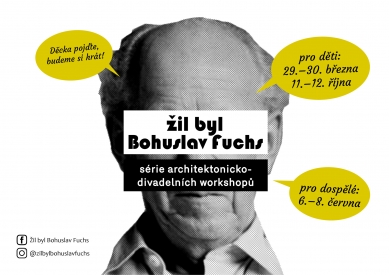
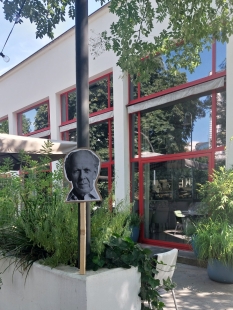
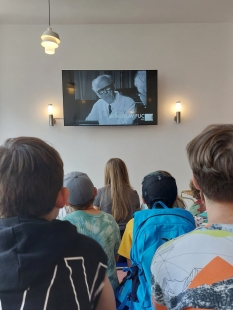
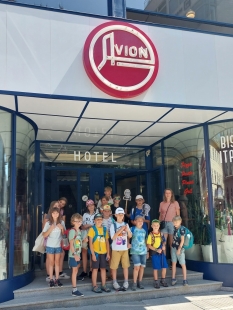
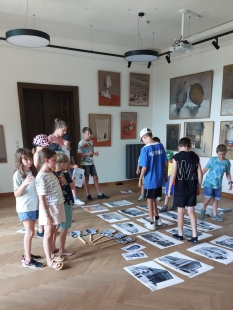
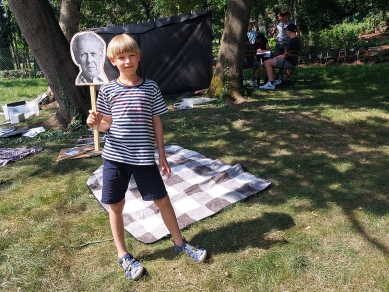
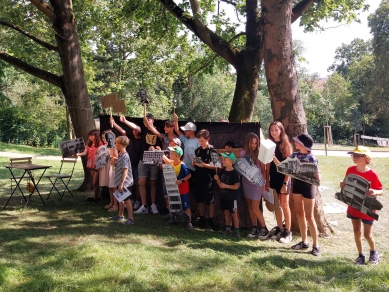
0 comments
add comment
Related articles
0
13.09.2025 | Bohuslav Fuchs lived - workshop results
0
19.03.2025 | Symposium in honor of Bohuslav Fuchs at the Brno MCMA
2
11.03.2025 | The anniversary of architect Fuchs will be commemorated in Brno, for example, by a traveling inflatable sculpture
0
10.03.2025 | Jana Laubová: 130 Years of Bohuslav Fuchs - Lecture in Jihlava
0
27.02.2025 | European Architect Bohuslav Fuchs - Discussion and Screening
0
04.11.2015 | Bohuslav Fuchs - traveling exhibition at the Architecture Gallery Brno
0
24.03.2015 | Bohuslav Fuchs – lecture by architect Jan Sapák
0
03.06.2014 | Opening of the permanent exhibition of the life and work of Bohuslav Fuchs
0
09.12.2010 | In Vienna, an exhibition about the architect Bohuslav Fuchs has started








